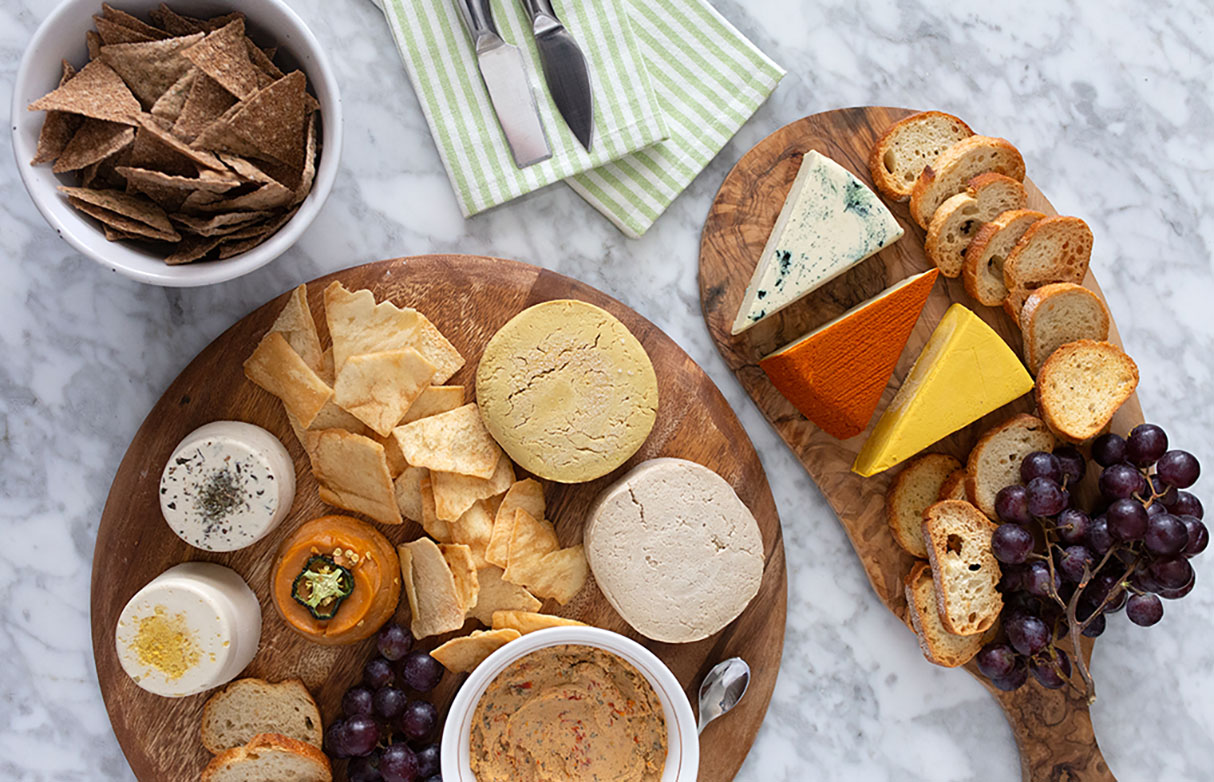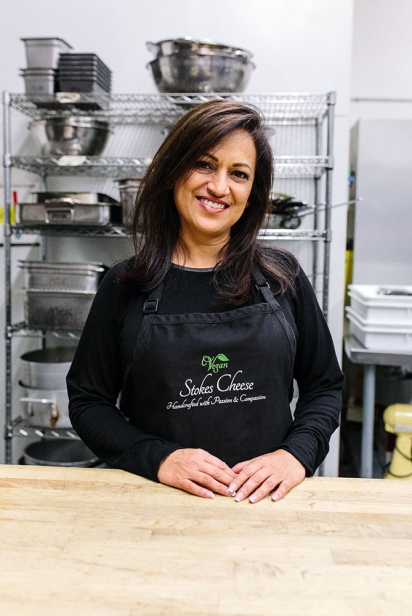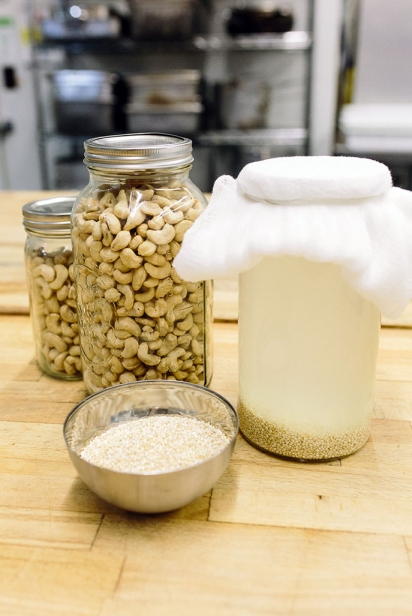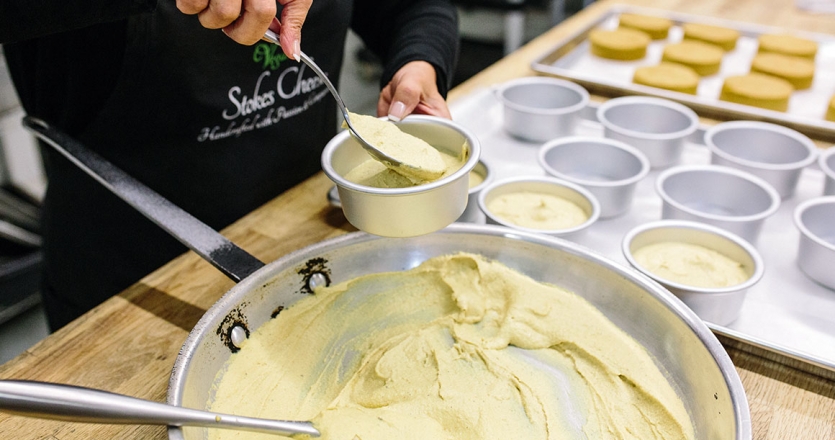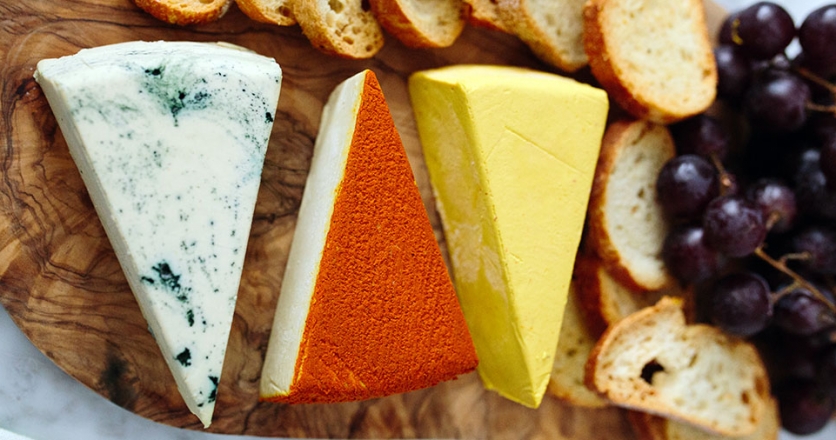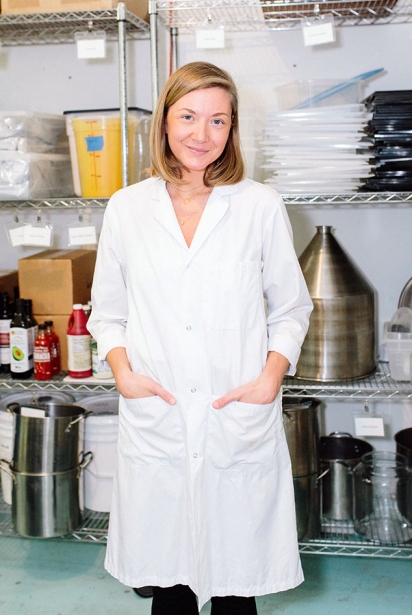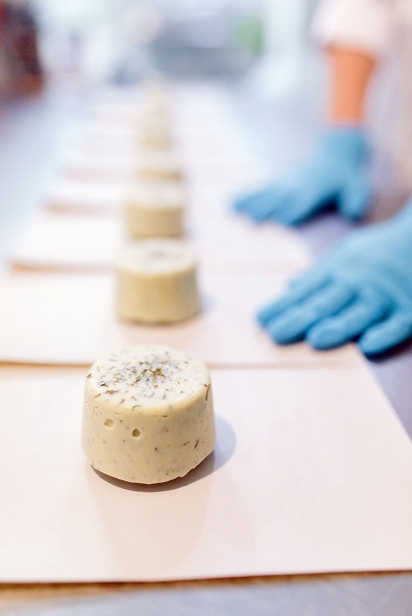Cheese Please. Hold the Dairy
What's the hardest part about making vegan cheese? Getting that little milking stool under the cashew. But the joke's on those who believed nut-based cheeses could never satisfy a dairy cheese craving.
My moment of cheesy truth came at a New Year's Day party a few years ago and an encounter with nicely tangy blue, a semi-firm cheddar and a wedge of brie. All were made from cashews. They didn't nail the texture, but they had the familiar salty-umami flavour that pinged savoury "cheese" to my tastebuds and brain.
A Google search of vegan and vegetarian cheese recipes turns up plenty of make-at-home options, most involving soaking raw cashews in water for a spell, then blending them into a creamy paste that can be used as a base for salad dressings, dips or spreadable cheeses.
Enter vegan cheesemakers, people who were firmly in the "I love cheese" camp in their pre-plant-based-eating lives. When they changed how they ate, they faced a cheese-shaped hole in their diets, craving something more sophisticated than the rubbery, often-oily early versions of dairy-free cheese.
They were not alone in their cheese cravings. Sarah Dobec, marketing manager at The Big Carrot Community Market, says the Danforth store carries four brands of nut-based cheeses, with Toronto's Culcherd the top seller there.
"[Vegan cheese] is definitely popular and it seems even more so with millennials," she says.
A handful of Ontario producers are making "artisanal" vegan cheeses, using fermentation and brief aging to develop full cheese-like flavours, heightened with the addition of herbs, spices and natural flavours from wine to nutritional yeast.
What they don't employ to trigger the fermentation is rennet, the enzyme-rich material sourced from ruminants' stomachs used in dairy cheeses. Rennet causes the curdling — the curds and whey of Little Miss Muffet fame — that are separated to make cheese. Nor is heat used in vegan cheesemaking.
The culturing agent preferred by most vegan cheesemakers is a lactobacillus (friendly bacteria) called rejuvelac, a liquid usually made from sprouted organic quinoa. At London, Ont.'s Nuts for Cheese, founder and owner Margaret Coons pairs coconut-based culture with rejuvelac.
What vegan cheesemakers do have in common with their dairy counterparts is a passion and respect for the taste of cheese.
Take Tina Stokes. When the founder and president of Vegan Stokes Cheese went vegan, she started making dairy-free cheese at home to satisfy her craving for "the big, bold, robust flavours" she missed.
Encouraged by her husband and friends who loved her vegan cheese, Stokes started selling products made in her kitchen north of Toronto at the Evergreen Brick Works Farmers Market. Demand grew quickly.
She quit her management job with the Ontario government slightly more than a year ago to work full-time on Vegan Stokes Cheese, moving to a small production facility in York Region. Vegan Stokes makes three semi-firm cheeses, including an aged cheddar, along with three varieties of creamy spreads. Their crumbly, herbed feta-style cheese is made from non-GMO tofu.
Coons, former chef at now-closed vegan restaurant Veg Out in London, was another cheese lover who started making non-dairy cheese after she went vegan as a teenager.
Her vegan cheese board was a top seller at her restaurant, so she started selling her smoky artichoke and herb, a cashew-milk cheese marbled with a pumpkin seed and artichoke pesto (still Nuts for Cheese's top seller), at local farmers' markets in 2015.
Coons opened her 11,000-square-foot production facility in London a year later. She employs 22 people and ships five varieties of vegan cheese, including Un-brie-Lievable and Super "Blue" marbled with spirulina, to retailers across Canada.
"I always say it's real cheese made from nuts," Coons says.
Tim Donnelly and Liz Gallagher, co-founders of Culcherd in Toronto, had that same love of cheese as Coons and Stokes, one that continued, although in a new way, after going vegan.
Culcherd makes five nut-based "cheeze" products and butterless butter made from cashews and coconut oil.
"I was a big cheese fan," says Gallagher, a chef who cooks daily with Culcherd's products for recipe development. The evidence is on the company's Instagram feed, which is full of lush photos and recipes including a variety of pizzas, pulled spicy jackfruit, butternut squash and sage dip, sweet potato gnocchi and a "seasonal cheesecake," Candy Cane Chocolate Crackle.
Unlike other vegan cheesemakers, they spell their product name differently from dairy varieties, although they acknowledge calling it "cheeze" may not be necessary.
But naming can be a hot-button topic. Vancouver's first vegan cheese seller, Blue Heron, was told to stop using "cheese" to market its dairy-free Blue Heron Creamery products by the Canadian Food Inspection Agency in January 2019 after allegedly receiving complaints from the public.
By February, the CFIA had reversed its decision and said makers could use "100 per cent dairy-free plant-based cheese" on their website and language such as cheddar-style for other products. Karen McAthy, chef and co-owner of Blue Heron says she hopes the ordeal will "open up room for meaningful consideration of the need for updated regulations that relate to the rapidly emerging dairy-free cheese sector" and a broader look at what cheese is.
Stokes says she hasn't had any complaints from the CFIA about Vegan Stokes Cheese labelling. Nor has Nuts for Cheese.
Donnelly says their customers are a mix of those with allergies and those avoiding dairy for health, animal rights or environmental reasons.
"It's very good tasting. It's good for the environment and much better for the animals," Coons says.
Stokes says the all-raw, uncooked vegan products promote gut health and have zero cholesterol and lots of healthy fats. For her, the role vegan cheese plays in promoting animal welfare is key. Seeing video shot in an abattoir was what prompted her to immediately go vegan nearly six years ago.
Vegan Stokes Cheese links to a variety of animal-welfare websites on its own site, including PETA. The cheese packaging includes the slogan: Handcrafted with Passion & Compassion. "It's not about marketing for me. It's about the animals," Stokes says.
Then there's the taste. These entrepreneurs are creating products with characteristics that come close to the flavour and texture of dairy cheese. Most are semi-firm, akin to a goat-cheese texture. Coons adds agar to make a sliceable texture and also air-dries some varieties. Culcherd uses a dehydrator to remove moisture to make firmer cheeses.
Who's buying vegan cheese? Coons says about 80 per cent of her customers say the main reason they choose her products is for the taste. Not all of her buyers are vegan or vegetarians, while about 40 per cent are avoiding dairy for lifestyle and health reasons.
She says that's reflected in the new 2019 Canada Health Guide, which dropped the "milk and alternatives" category to add dairy into foods in the protein quarter of the guide instead.
"It's awesome. I think it really reflects the way our diets are changing and eating habits are changing and shifting away from dairy," Coons says.
Demand continues to increase for non-dairy cheese, which sells for $10 to $15 per small wheel or wedge, a price that reflects the cost of the primary ingredient, organic cashews. All three companies are introducing new flavours and products in 2019, along with expanding into new markets.
From a nutritional standpoint, nut cheeses are cholesterol-free and the fats are of the heart-healthy variety, although they are lower in protein and calcium than dairy cheese.
Traditionally, one of the biggest complaints about non-dairy cheese is that it lacks stretchiness, but products continue to improve.
Stokes melts Vegan Stokes sundried-tomato spread in marinara to make a decadent rose sauce. Sliceable varieties make a satisfying grilled cheese, she says, getting just as melty and gooey as dairy cheese, minus the stretch.
Coons recommends briefly freezing her cheeses before grating them onto pizza, pasta or nachos, where "they melt beautifully." "
It's definitely different. It's tricky to replicate a Gouda or an Oka or a specific type of cheese," Gallagher says of the challenges of making nut cheese. "But I think it stacks up pretty well. It's incredible what you can do with cashews."
Culcherd
culcherd.com | @culcherd
Find it at: Noah's Natural Foods, Fresh City Farms, Karma Coop, Summerhill Market
Nuts for Cheese
nutsforcheese.com | @nutsforcheese
Find it at: Farm Boy, The Healthy Butcher, Urban Acorn, select Sobeys Stokes
Vegan Cheese
veganstokes.com | @veganstokes
Find it at: Fiesta Farms, The Big Carrot, YamChops, Ambrosia, The Good Rebel


